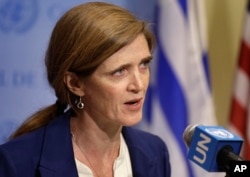The U.N. Security Council has postponed until Wednesday a vote on resolution that would impose new sanctions on North Korea in response to its latest nuclear test and long-range missile launch.
The vote had been expected Tuesday afternoon but Russia invoked a 24 hour procedural review, according to the U.S. mission to the United Nations.
The resolution, drafted by the United States and introduced last Thursday, calls for a total arms embargo on Pyongyang, a mandatory inspection of all cargo in and out of North Korea, whether by land, sea or air, and halts imports of all products that could be used for military purposes. The vote was already delayed for a few days when Russia declared it needed to study the document.
Samantha Power, the U.S. ambassador to the U.N., said the resolution "would break new ground and represent the strongest set of sanctions imposed by the Security Council in more than two decades." The U.N. already has imposed a number of sanctions on North Korea in response to past nuclear and ballistic missile tests.
The U.S. submitted the resolution after several weeks of negotiations with China, North Korea's closest ally and largest trading partner. Beijing was angered by the North's January nuclear test and its February 7 ballistic missile test, but it has been reluctant to support harsh international sanctions on Pyongyang for fear of destabilizing the country and triggering a surge of refugees across their border.
The resolution also bans imports to North Korea of aviation and rocket fuel, as well as exports of commodities such as coal, iron, gold, titanium and rare earth minerals. It also adds 17 individuals and 12 entities to the U.N.'s sanctions blacklist, including North Korea's space agency NADA, and requires nations to expel North Korean diplomats engaging in illegal activities.
In a televised speech Tuesday ahead of the vote, South Korean President Park Geun-hye says the international community must continue to pressure North Korea until the regime proves it is committed to giving up its nuclear weapons development program.
VOA United Nations correspondent Margaret Besheer contributed to this report






